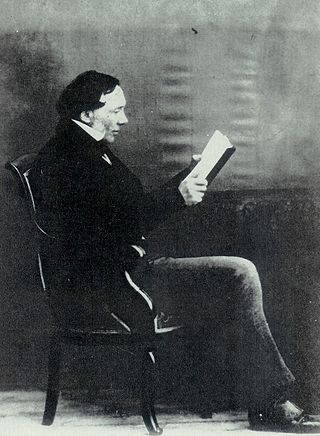
John Henry Newman was an English theologian, academic, intellectual, philosopher, polymath, historian, writer, scholar and poet, first as an Anglican priest and later as a Catholic priest and cardinal, who was an important and controversial figure in the religious history of England in the 19th century. He was known nationally by the mid-1830s, and was canonised as a saint in the Catholic Church in 2019.

Keble College is one of the constituent colleges of the University of Oxford in England. Its main buildings are on Parks Road, opposite the University Museum and the University Parks. The college is bordered to the north by Keble Road, to the south by Museum Road, and to the west by Blackhall Road.

Pusey House is an Anglican religious institution located on St Giles', Oxford, United Kingdom, immediately to the south of Pusey Street. It is firmly rooted in the Anglo-Catholic Prayer Book tradition of the Church of England, and was founded in 1884 in memory of Edward Bouverie Pusey, Regius Professor of Hebrew at Oxford University, and one of the leaders of the Oxford Movement.

John Keble was an English Anglican priest and poet who was one of the leaders of the Oxford Movement. Keble College, Oxford, was named after him.

Edward Bouverie Pusey was an English Anglican cleric, for more than fifty years Regius Professor of Hebrew at the University of Oxford. He was one of the leading figures in the Oxford Movement.

Henry Parry Liddon (1829–1890), also known as H. P. Liddon, was an English theologian. From 1870 to 1882, he was Dean Ireland's Professor of the Exegesis of Holy Scripture at the University of Oxford.

James Robert Hope-Scott was a British barrister and Tractarian.

Henry Edward Manning was an English prelate of the Catholic church, and the second Archbishop of Westminster from 1865 until his death in 1892. He was ordained in the Church of England as a young man, but converted to Catholicism in the aftermath of the Gorham judgement.

The Oxford Movement was a movement of high church members of the Church of England which began in the 1830s and eventually developed into Anglo-Catholicism. The movement, whose original devotees were mostly associated with the University of Oxford, argued for the reinstatement of some older Christian traditions of faith and their inclusion into Anglican liturgy and theology. They thought of Anglicanism as one of three branches of the "one, holy, catholic, and apostolic" Christian church. Many key participants subsequently converted to Roman Catholicism.

Alexander Penrose Forbes was a Scottish Episcopalian divine, born in Edinburgh. A leading cleric in the Scottish Episcopal Church, he was Bishop of Brechin from 1847 until his death in 1875.
Richard Hurrell Froude was an Anglican priest and an early leader of the Oxford Movement.

George Anthony Denison (1805–1896) was an English Anglican priest. He served as Archdeacon of Taunton from 1851.

Robert Isaac Wilberforce was an English clergyman and writer.

William Lockhart was an English Roman Catholic priest; the first of the Tractarian Movement to convert from Anglicanism to Roman Catholicism.
The word saint derives from the Latin sanctus, meaning holy, and has long been used in Christianity to refer to a person who was recognized as having lived a holy life and as being an exemplar and model for other Christians. Beginning in the 10th century, the Catholic Church began to centralise and formalise the process of recognising saints; the process whereby an individual was added to the canon (list) of recognised saints became known as canonisation.

John Medley,, was a Church of England clergyman who became the first bishop of Fredericton in 1845. In 1879 he succeeded Ashton Oxenden as Metropolitan of Canada.
The Library of Anglo-Catholic Theology was a series of 19th-century editions of theological works by writers in the Church of England, devoted as the title suggests to significant Anglo-Catholic figures. It brought back into print a number of works from the 17th century, concentrating though not exclusively on the Caroline Divines. The publication of the Library, from 1841, was connected with the Oxford Movement which had begun in 1833; some of the editors, such as William John Copeland and Charles Crawley were clearly identified with the movement. However the interests of the Library diverged early from those of the Tractarians. A total of 95 volumes by 20 writers was published over a dozen years; the plan, originally, had been to include 53 authors. The Library of Anglo-Catholic Theology was founded in response to the Parker Society.
The Tracts for the Times were a series of 90 theological publications, varying in length from a few pages to book-length, produced by members of the English Oxford Movement, an Anglo-Catholic revival group, from 1833 to 1841. There were about a dozen authors, including Oxford Movement leaders John Keble, John Henry Newman and Edward Bouverie Pusey, with Newman taking the initiative in the series, and making the largest contribution. With the wide distribution associated with the tract form, and a price in pennies, the Tracts succeeded in drawing attention to the views of the Oxford Movement on points of doctrine, but also to its overall approach, to the extent that Tractarian became a synonym for supporter of the movement.
Godfrey Faussett (c.1781–1853) was an English clergyman and academic, Lady Margaret Professor of Divinity at Oxford from 1827. He was known as a controversialist. As a churchman he exemplified the high-and-dry tradition.